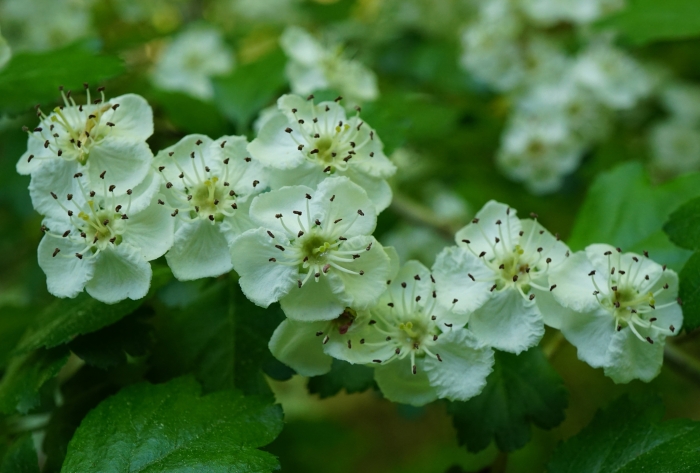Broad-Leaved Cockspur Thorn
(Crataegus macrocarpa)
Broad-Leaved Cockspur Thorn (Crataegus macrocarpa)
/
/

© Patrick Hacker
CC BY 4.0
Image By:
© Patrick Hacker
Recorded By:
Copyright:
CC BY 4.0
Copyright Notice:
Photo by: © Patrick Hacker | License Type: CC BY 4.0 | License URL: http://creativecommons.org/licenses/by/4.0/ | Uploader: pastabaum | Publisher: iNaturalist |


















Estimated Native Range
Summary
Crataegus macrocarpa, commonly known as the Broad-leaved Cockspur Thorn, is a hybrid hawthorn tree resulting from the cross between Crataegus laevigata and Crataegus rhipidophylla. It is a deciduous tree that can be mistaken for Crataegus × media, as it exhibits characteristics intermediate between its two parent species. This hybrid typically thrives in a range of habitats, including hedgerows, woodlands, and along riverbanks in Europe. It generally reaches heights of 15-25 feet (4.5-7.6 meters) with a similar spread, and it forms a rounded crown with dense branching.
The Broad-leaved Cockspur Thorn is valued for its clusters of white flowers that bloom in late spring, followed by red berries that persist into winter, providing food for birds. The flowers are moderately showy and attract pollinators. Its glossy, dark green leaves turn to shades of yellow and red in the fall, adding seasonal interest. This tree is often used in urban landscapes, as a specimen tree, or for wildlife gardens due to its ornamental appeal and ecological benefits. It prefers well-drained soils, tolerates a range of soil types, and grows best in full sun to part shade. While generally low-maintenance, it can be susceptible to leaf spot and rust diseases, and may require occasional pruning to maintain its shape and remove any diseased wood.CC BY-SA 4.0
The Broad-leaved Cockspur Thorn is valued for its clusters of white flowers that bloom in late spring, followed by red berries that persist into winter, providing food for birds. The flowers are moderately showy and attract pollinators. Its glossy, dark green leaves turn to shades of yellow and red in the fall, adding seasonal interest. This tree is often used in urban landscapes, as a specimen tree, or for wildlife gardens due to its ornamental appeal and ecological benefits. It prefers well-drained soils, tolerates a range of soil types, and grows best in full sun to part shade. While generally low-maintenance, it can be susceptible to leaf spot and rust diseases, and may require occasional pruning to maintain its shape and remove any diseased wood.CC BY-SA 4.0
Plant Description
- Plant Type: Shrub, Tree
- Height: 15-30 feet
- Width: 15-30 feet
- Growth Rate: Moderate
- Flower Color: White
- Flowering Season: Spring
- Leaf Retention: Deciduous
Growth Requirements
- Sun: Full Sun, Part Shade
- Water: Medium
- Drainage: Medium, Fast
Common Uses
Bird Garden, Border Plant, Butterfly Garden, Erosion Control, Low Maintenance, Showy Flowers, Water Garden
Natural Habitat
Thrives in hedgerows, woodlands, and along riverbanks in Europe
Other Names
Common Names: Large-Fruited Hawthorn, Bigfruit Hawthorn
Scientific Names: , Crataegus macrocarpa, Crataegus laevigata × rhipidophylla, Crataegus monogyna var. macrocarpa, Crataegus oxyacantha f. longisepala, Crataegus oxyacantha f. macrocarpa, Crataegus oxyacantha subsp. macrocarpa, Crataegus oxyacantha var. cremnicensis, Crataegus oxyacantha var. macrocarpa, Crataegus oxyacantha var. macrocarpa
GBIF Accepted Name: